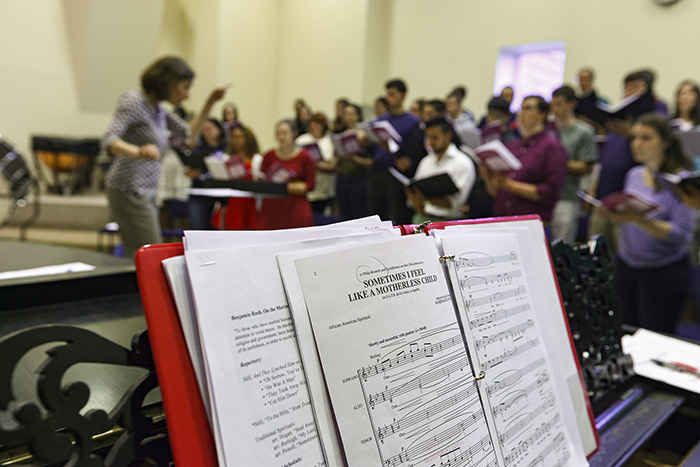Why Black Music Matters

Photo by Carl Socolow '77.
Inspired by social justice movement, concert delivers a powerful punch
by MaryAlice Bitts-Jackson
An undersung artistic heritage found voice during a concert inspired by the Black Lives Matters social justice movement. Held one day after Black Lives Matter co-founder Alicia Garza delivered a conference keynote address at Dickinson, the Black Music Matters concert used music, text, multimedia and student research to bring black creativity, identity, history and accomplishments into the spotlight.
The College Choir performed a work by Harry T. Burleigh, the first African-American composer to graduate from the National Conservatory of Music; William Grant Still’s 1939 oratorio And They Lynched Him on a Tree; and Rosephanye Powell’s arrangement of “Sometimes I Feel Like a Motherless Child.”
The Dickinson College Jazz Ensemble assembled a program of social justice works by Dizzy Gillespie and collaborators Duke Ellington and Billy Strayhorn. The Dickinson Improvisation & Collaboration Ensemble (DICE) highlighted music by Florence Price, the first African-American woman to have a composition premiered by a major American symphony orchestra; Julius Eastman, a minimalist composer whose works confronted racist and homophobic stereotypes; and Frederic Rzewski, whose Attica added musical context to landmark witness testimony about the inhumane treatment of black inmates at Attica prison.
That historical footage was one of 10 multimedia clips peppered throughout the performance, including interpretations of texts and poetry by Frederick Douglass; Langston Hughes; Esther Popel Shaw, class of 1919; and others, performed by students, faculty and staff.
For the performers, an event like this can raise awareness of racism in the U.S., past and present, and deepen their understanding of interconnected issues, said clarinetist Katya Hrichak ’17 (English, music), who played in DICE and contributed to the poster session showcasing student research on black composers and black music.
The same is true for audience members, many of whom have a limited exposure to non-Eurocentric music and arts, said saxophonist Edwin Padilla ’16 (computer science, music), who performed with the Jazz Ensemble.
Padilla hopes that while audience members become more aware of the artistic contributions of black musicians, writers and thought leaders, they also will find inspiration and agency during a significant moment in American history. “This is not a post-racism age by any means; many of the issues spoken about in this program still resonate today,” he said. “I'd like the audience and community to remember that and to engage.”
A poster session showcasing student research on black composers and black music will be on display in the Weiss Center for the Arts lobby through April 30.
Learn more
Published April 8, 2016